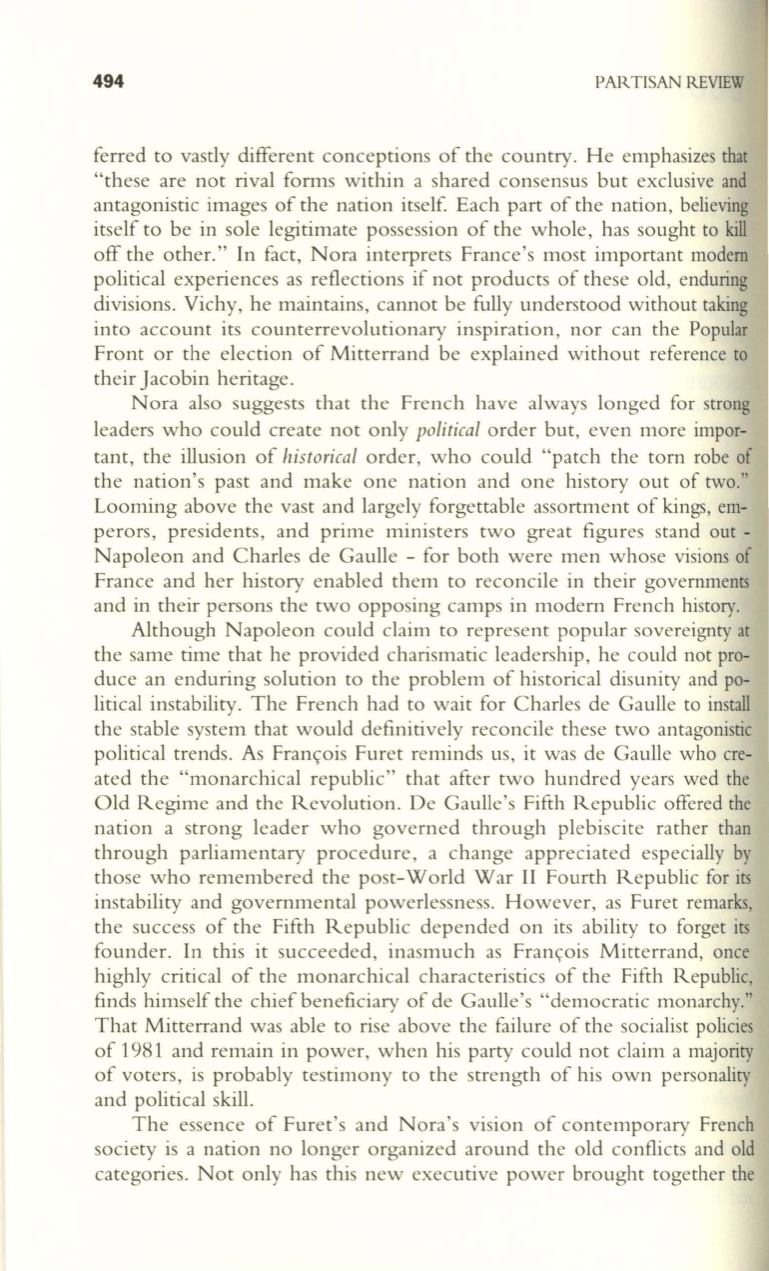
494
PAR.TISAN REVIEW
ferred to vastly different conceptions of the country. He emphasizes that
"these are not rival forms within a shared consensus but exclusive and
antagonistic images of the nation itself Each part of the nation, believing
itself to be in sole legitimate possession of the whole, has sought to
kill
off the other." In fact, Nora interprets France's most important modern
political experiences as reflections if not products of these old, enduring
divisions. Vichy, he maintains, cannot be fully understood without taking
into account its counterrevolutionary inspiration, nor can the Popular
Front or the election of Mitterrand be explained without reference to
their Jacobin heritage.
Nora also suggests that the French have always longed for strong
leaders who could create not only
political
order but, even more impor–
tant, the illusion of
historical
order, who could "patch the torn robe of
the nation's past and make one nation and one history out of two."
Looming above the vast and largely forgettable assortment of kings, em–
perors, presidents, and prime ministers two great figures stand out -
Napoleon and Charles de Gaulle - for both were men whose visions of
France and her history enabled them to reconcile in their governments
and in their persons the two opposing camps in modern French history.
Although Napoleon could claim to represent popular sovereignty at
the same time that he provided charismatic leadership, he could not pro–
duce an enduring solution to the problem of historical disunity and po–
litical instability. The French had to wait for Charles de Gaulle to install
the stable system that would definitively reconcile these two antagonistic
political trends. As Franyois Furet reminds us, it was de Gaulle who cre–
ated the "monarchical republic" that after two hundred years wed the
Old Regime and the Revolution. De Gaulle's Fifth Republic offered the
nation a strong leader who governed through plebiscite rather than
through parliamentary procedure, a change appreciated especially by
those who remembered the post-World War II Fourth Republic for its
instability and governmental powerlessness. However, as Furet remarks,
the success of the Fifth Republic depended on its ability to forget its
founder. In this it succeeded, inasmuch as Franyois Mitterrand, once
highly critical of the monarchical characteristics of the Fifth Republic,
finds himself the chief beneficiary of de Gaulle's "democratic monarchy."
That Mitterrand was able to rise above the failure of the socialist policies
of 1981 and remain in power, when his party could not claim a majority
of voters, is probably testimony to the strength of his own personality
and political skill.
The essence of Furet's and Nora's vision of contemporary French
society is a nation no longer organized around the old conflicts and old
categories. Not only has this new executive power brought together the


